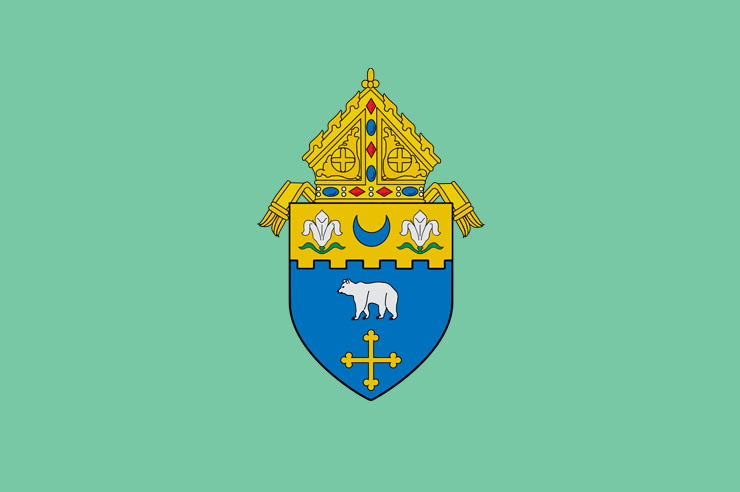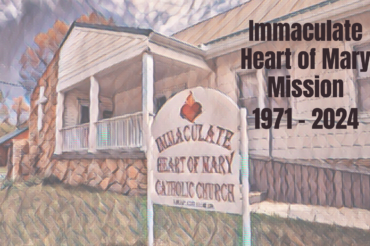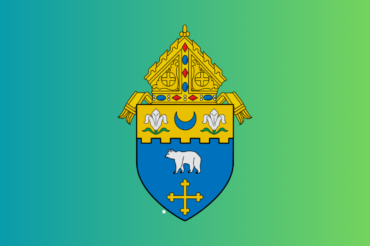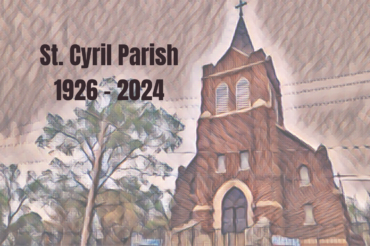Diocesan Finance Council Approves 2020-21 Fiscal Year Budget

The Diocesan Finance Council is a consultative body that provides advice to the Bishop in areas of finance and business, as well as certain acts of extraordinary administration, in ways similar to how a parish finance council advises a pastor. While advisory in nature, there are certain matters in financial administration that require actual consent of the Finance Council, for example, certain types of property transactions and changes to the Diocesan assessment formula. As mandated in Canon Law, members of the Council are skilled in civil law, business and financial affairs, as well as possessing an understanding of and dedication to the Mission of the Church.
Two major responsibilities of the Finance Council are (1) to review and approve the annual operating budget, and (2) to review and approve the annual Diocesan Audit.
Our Finance Council is currently a 14-member body:
Most Reverend James V. Johnston, Jr. – Bishop, Catholic Diocese of Kansas City-St. Joseph;
David Brain – CEO, Brown Cow Capital, LLC
John Crowe – self employed;
Christine DeMarea – Partner, Husch Blackwell, LLP;
John DeStefano – Retired Senior Vice President of Finance and Treasurer, Great Plains Power, Inc.;
Rev. Ron Elliott – Pastor, St. John LaLande Parish, Blue Springs;
Theresa Hupp – Retired Director of Employee Relations and Staff, Hallmark Cards;
Eileen Hutchinson – Retired Vice President of Finance/CFO, Government Employees Health Assoc., Inc.;
Alan Lankford – President, Lankford and Associates;
Thomas McCullough – Retired Executive Vice President; DST Systems, Inc.;
George McLiney – Chairman Emeritus, McLiney & Company;
Rev. Patrick Rush – Retired Diocesan Priest;
Margo Shepard – Senior Vice President, Wells Fargo Advisors;
Jim VanDyke – Retired Partner; BKD, LLP CPA’s and Advisors;
Jeremy Lillig –Diocesan Director of Stewardship and Development/Director of Strategic Planning (ex officio).
The Diocese has had a Diocesan Investment Committee since 1995. Tracey Lewis chairs this committee, and is joined by Katheigh Degen, Kevin Emmendorfer, Ray Evans, Marlin Fiola, Linda Hanson, Joseph Massman and Joe Nastasi. The Investment Committee continually reviews the investment policies, objectives and performance of the Priest Retirement Trust, the Lay Employee Retirement Trust, the Charitable Gift Annuity Trust, the Deposit and Loan Fund and certain other Diocesan investments/trusts.
Dave Malanowski, as Diocesan Finance Officer, and Monica Adams as Internal Auditor/Risk Manager, staff both the Finance Council and the Investment Committee.
Highlights of the 2020/2021 Diocesan Chancery Operation Budget
By David A. Malanowski, Diocesan Finance Officer
The Diocesan Finance Council, at its meeting on June 4th, recommended approval of the operating budget of the Diocesan Chancery Operation for the 2020/2021 fiscal year, which began July 1, 2020. Bishop James V. Johnston, Jr. subsequently accepted the recommendation. The review and approval of this ‘balanced’ budget by the Diocesan Finance Council is one of the two primary responsibilities of a Diocesan Finance Council which are stipulated in Canon Law, the other being the review of the annual audit. Thus, it is a significant and extremely important responsibility. Equally important is the responsibility of Bishop Johnston, his advisors and staff to present to the Faithful of our Diocese the content of the annual budget in that it is funded largely from your direct contributions through the Annual Catholic Appeal (ACA) and, indirectly, through an assessment of contributions (the “Cathedraticum” assessment) made at the parish level. Bishop Johnston and I have a responsibility to be clear in describing for you where the money comes from and how it is allocated. It is in this spirit of disclosure and financial accountability that we present here information regarding the 2020/2021 Operating Budget of the Diocesan Chancery Operation.
The operating budget of the Diocesan Chancery Operation reflects the functions and ministries coordinated at the Chancery Offices/Catholic Center and the four campus ministry locations. It is sometimes informally referred to as the Diocesan Budget or the budget of the Diocesan Administrative Offices. It does not include Catholic Charities, Catholic Cemeteries, the Diocesan Insurance Program, and the Deposit and Loan Trust, as well as our parishes and schools, all of which are separate entities that have their own budgets. Bishop Johnston’s Administrative Cabinet functions as the “budget committee’ and I, as the Finance Officer, chair the budget process, which started in January with a three and ½ month discussion of the significant topics and issues. This discussion of the ‘macro’ issues led to crafting specific budget directives which were used by office and program directors to complete line item budgets. The resulting balanced budget was, and is always, a true collaborative effort. Certainly, the reality and uncertainties of the COVID-19 pandemic impacted the budget deliberations, as I would imagine they did for all organizations and businesses, particularly not-for-profits.
The total Diocesan Chancery Operation Budget for 2020/2021 is $13.13 Million, which is a 2.4% decrease from 2019/2020. The budget, as it has been for at least the last 28 years, is a balanced budget and, in fact, could be considered a surplus budget, with a small surplus going to enhance certain key reserve areas relating to seminarian education, priests on special assignment and the care and upkeep of certain properties.
There are five primary sources of income which fund the operational budget (see pie chart).
The largest source of income is the Diocesan Cathedraticum Assessment, which is an assessment on parish income based on a defined formula approved by the local bishop after consulting with the Presbyteral Council and the Diocesan Finance Council. The Diocesan Cathedraticum Assessment amount for 2020/2021 is $6,680,000, which is an increase of $120,000 from 2019/2020. It represents 51% of our total income.
A second important source of income is the Annual Catholic Appeal, which raises funds for several of our important programs and ministries. For 2020/2021, the Annual Catholic Appeal is budgeted at $1,680,000. These funds go entirely toward our programs for education, catechesis and faith formation, vocations and seminarian education, various areas of pastoral ministry and social services/outreach. The total cost of these areas alone exceeds $3.0 million.
User fees, outside income (rentals, advertising etc.), grants, certain diocesan-wide collections, internal transfers and miscellaneous contributions make up a collective third source of income ($3,453,000). Included in this amount is $140,000 budgeted for the ‘Tomorrow’s Priests’ Diocesan Collection to be conducted in May 2021 to help address the increasing costs for seminarian support and education, as well as to assist in funding the work of the Vocations Office. Total grant income is approximately $140,000.
Another primary source of funding is “net” interest income, budgeted in 2020/2021 at $80,000. This income source is a net combination of three components and is calculated as follows: 1) the “net” interest income amount approved by the Board of Trustees of the separate Deposit and Loan Trust to be transferred to the Diocesan Chancery Operation ($350,000), PLUS 2) total interest and investment income of the Diocesan Chancery Operation less interest paid on deposits and internal endowments associated with the Diocesan Chancery Operation ($30,000), MINUS 3) an allocation to the Property and Casualty Operation as directed by the Diocesan Finance Council ($300,000).
Also, there is an amount of income ($1,100,000) from interest/earnings on restricted and designated endowments, as well as the use of certain designated funds.
The chart shows the operating budget by eight (8) major cost categories. 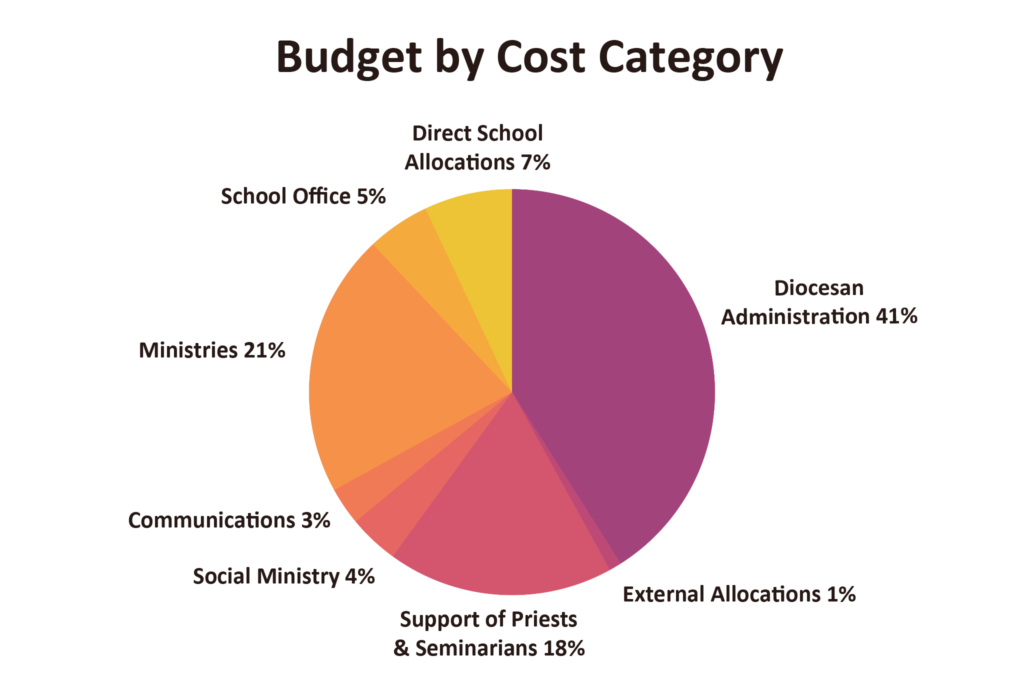
School Office Operation – income and expense associated with the office that oversees the administration of 24 elementary, 3 high schools, and 8 early childhood centers.
Direct School Allocation – direct payments to the Bright Futures Fund and the three Diocesan high schools.
Social Ministry – primarily a direct subsidy payment to Catholic Charities, as well as the operation of the Human Rights Office, our Restorative Justice Program subsidy, the subsidy for the Ministry to the Disabled and certain housing initiatives.
Pastoral Ministries – operation of those offices that train and support pastoral ministers as well as offer many formational opportunities to the people and parishes of the Diocese. These offices include Divine Worship, Family Life, Youth, Campus Ministry, Young Adult, Permanent Diaconate, Respect Life, Hispanic Ministry and Catechesis and Faith Formation.
Communications – the Communications/Media Relations function and some form of periodic Diocesan publication to be determined.
Support of Priests/Seminarians – costs relating to (1) the canonical mandates of care and support of priests, (2) support and education of seminarians, (3) vocation awareness and development, (4) Bishop’s residence.
External Allocations – direct payments to support entities of the broader Church outside the Diocese. These entities range from the Missouri Catholic Conference to the U. S. Conference of Catholic Bishops to the Holy See.
Diocesan Administration – those administrative and systems costs that allow the Bishop to effectively oversee the 100-plus parishes, schools and other operations of the Diocese.
Balancing the 2020/21 budget was challenging for several reasons, most notably the COVID-19 virus. Two key decisions were made which had not surfaced in past years. First, the salary level for 2020/21 is held at the 2019/2020 level. This is for all Chancery employees – lay, clergy and religious. The zero increase for our clergy was also a decision implemented for clergy in all our parishes, schools and other Diocesan entities. Second, staff development and conference registration/attendance costs are eliminated. A small amount ($15,000) is preserved for exceptional situations that might come along.
Included in the 2020/2021 Diocesan Chancery Operation Budget are several efforts directly related to our completed Diocesan Shared Mutual Vision and Pastoral Plan. First is $65,000 to fund the continuation of the Comprehensive Resource Study to help the Diocese ascertain how it can best equip itself for its Mission long term. Restricted contributions are to be used to partially offset this cost. Second is $125,000 to fund the next steps in the planning for ‘Journey to Bethany’, a healing center/function in the Diocese to respond to both the abuse scandal in the Church as a well as other challenges people confront which might require healing and pastoral care. The $125,000 cost represents communication, website development, branding, and the possibility of a three-quarter FTE director position. This overall cost is partially offset by $80,000 of outside funding. A third area is $20,000 for the continued feasibility study efforts related to a possible future retreat center/camp facility within our Diocese.
The seminarian education budget decreased by $93,000 to approximately $1,047,000 with the number of seminarians projected at 22. This represents 11 men in college and 11 men in Pre-Theology/Theology. This year the Chancery Operation will use approximately $540,000 of seminarian reserves to assist in funding the overall seminarian education budget. The seminarian education budget is the largest budget in the overall Chancery Operation Budget.
The Chancery Operation Budget reflects a change in direction in the area of Communications/Media Relations. The Catholic Key, which was the bi-weekly printed publication distributed to parishes and households, was ceased by Bishop Johnston in early June. A new Director of Communications has been hired and started July 1st. This Director will work with Bishop Johnston and Diocesan leadership to form and oversee the overall Communications strategy moving forward, including the existing area of social media.
Also reflected are changes in Campus Ministry and Young Adult Ministry. There will no longer be full-time campus ministers at CMSU (Warrensburg) and WMSU (St. Joseph). There will be a new Director of Campus Ministry who will: a) direct and actively work with stipended student workers at CMSU and WMSU as well as b) oversee our four campus ministry locations which include NWMSU (Maryville) and UMKC. Also, the chaplains at UMKC and WMSU will be increased from 10% time to 20% time. In the area of Young Adult Ministry, staffing resources have been shifted, but these shifts will not result in any change in overall payroll costs.
Management Information Systems will continue implementation of the Information Technology Strategic Plan. $53,000 is allocated to back-up server replacement, replacement of server hardware and enhancement of IT security.
The Chancery Operation continues its support of Catholic high school education and our three separately incorporated Diocesan high schools in the amount of $488,000. The support for Bishop LeBlond will be $130,000, the support for St. Pius X will be $58,000 and the support for the St. Michael the Archangel will be $300,000.
The Chancery Operation continues its support of parish ministry (through $135,000 of parish- based ministry grants) as well as support of our sister organization – Catholic Charities. The Diocesan subsidy to Catholic Charities is set at $399,500.
The Chancery Operation continues its support of the Bright Futures Fund at a level identical to last year -$455,000. It represents a continued strong Fund commitment to Catholic Education at Holy Cross School, Our Lady of Hope School, St. Mary School (Montrose), Regis Academy, St. Pius X High School and St. Michael the Archangel High School.
Allocations will continue for several important ministries which are reflective of our commitment to supporting our various efforts of faith formation and discipleship, evangelization involving youth, young adults and adults, as well as serving the needs of the poor. These include the areas of Young Adult Ministry, Youth Ministry, Campus Ministry (four campus locations), the Office of Catechesis and Faith Formation, Family Life, Hispanic Ministry, Human Rights and Respect Life, as well as our support of Catholic Charities, the Bright Futures Fund and our Diocesan High Schools. The budget also continues to fund at appropriate levels those offices, cost centers and programs which are canonically required or necessary to administer an organization like ours.
If you have any questions about this budget or other aspects of the financial operation/condition of the Diocesan Chancery Operation, please contact me at 816-756-1850 or malanowski@diocesekcsj.org.
David A. Malanowski, Diocesan Finance Officer
Budget by Cost Category
| 2020/2021 Allocation | Other Income | Total Budget | ||
| School Office | ||||
| Office | 424,386 | 198,700 | 623,086 | |
| Subtotal | 424,386 | 198,700 | 623,086 | |
| Direct School Allocations | ||||
| Bright Futures Fund General Allocation | 455,000 | 0 | 455,000 | |
| High Schools | 488,000 | 0 | 488,000 | |
| Subtotal | 943,000 | 0 | 943,000 | |
| Social Ministry | ||||
| CCEAC Collection | 75,000 | 0 | 75,000 | |
| Charities Allocation | 84,500 | 158,000 | 242,500 | |
| Housing & Community Services | 6,000 | 15,000 | 21,000 | |
| Human Rights | 123,489 | 4,000 | 127,489 | |
| Ministry to Disabled | 30,000 | 10,000 | 40,000 | |
| Restorative Justice | 21,000 | 0 | 21,000 | |
| Subtotal | 339,989 | 187,000 | 526,989 | |
| Ministries | ||||
| Campus Ministry, NWMSU | 155,498 | 127,215 | 282,713 | |
| Campus Ministry, St. Joseph | 33,195 | 24,000 | 57,195 | |
| Campus Ministry, UMKC | 75,344 | 11,200 | 86,544 | |
| Campus Ministry, Warrensburg | 15,886 | 27,000 | 42,886 | |
| Criminal Justice Committee | 2,000 | 750 | 2,750 | |
| Diaconate Formation | 122,760 | 1,250 | 124,010 | |
| Family Life Office | 201,349 | 46,500 | 247,849 | |
| Hispanic Ministry | 112,810 | 10,230 | 123,040 | |
| Journey to Bethany -Planning | 45,000 | 80,000 | 125,000 | |
| Office of Campus Ministry | 85,643 | 0 | 85,643 | |
| Office of Catechesis & Faith Formation | 256,009 | 66,840 | 322,849 | |
| Office of Divine Worship | 155,621 | 6,550 | 162,171 | |
| Parish Based Ministry | 135,000 | 0 | 135,000 | |
| Pastoral Care Committee | 2,000 | 1,500 | 3,500 | |
| Permanent Diaconate Office | 39,539 | 1,574 | 41,113 | |
| Priestly Life/Ministry | 33,000 | 3,000 | 36,000 | |
| Respect Life | 109,580 | 37,945 | 147,525 | |
| Tribunal | 342,500 | 14,000 | 356,500 | |
| Young Adult Ministry | 151,000 | 93,000 | 244,000 | |
| Youth Office | 143,000 | 10,000 | 153,000 | |
| Subtotal | 2,216,734 | 562,554 | 2,779,288 | |
| Communications | ||||
| Communications Office | 278,000 | 96,000 | 374,000 | |
| Subtotal | 278,000 | 96,000 | 374,000 | |
| Support of Priests & Seminarians | ||||
| Bishop’s Residence | 72,198 | 0 | 72,198 | |
| Major/Minor Seminarians | 489,822 | 557,000 | 1,046,822 | |
| Priests on Special Assignment | 309,000 | 17,000 | 326,000 | |
| Reserve Plan | 120,000 | 0 | 120,000 | |
| Retired Priests’ Health Insurance & LTC | 115,000 | 400,000 | 515,000 | |
| Vocation Office | 76,180 | 147,000 | 223,180 | |
| Subtotal | 1,182,200 | 1,121,000 | 2,303,200 | |
| External Allocations | ||||
| Catholic University | 8,250 | 0 | 8,250 | |
| Holy See Support | 23,000 | 0 | 23,000 | |
| MO Catholic Conference | 98,000 | 0 | 98,000 | |
| USCCB | 69,600 | 0 | 69,600 | |
| Subtotal | 198,850 | 0 | 198,850 | |
| Diocesan Administration | ||||
| Archives | 231,129 | 0 | 231,129 | |
| Bishop’s General Administration | 51,772 | 1,700 | 53,472 | |
| Bishop’s Office | 224,313 | 14,000 | 238,313 | |
| Bishop’s Presbyteral Council | 3,320 | 3,400 | 6,720 | |
| Bishop Emeritus | 13,650 | 0 | 13,650 | |
| Bright Futures School Fund (Dev.) | 15,000 | 314,626 | 329,626 | |
| Chancellor’s Office/VG for Administration | 157,332 | 14,000 | 171,332 | |
| Chancery/Catholic Center | 373,676 | 1,119,100 | 1,492,776 | |
| Comprehensive Resource Study | 40,000 | 25,000 | 65,000 | |
| Doubtful Accounts Allowance | 60,000 | 0 | 60,000 | |
| Finance Office | 359,860 | 86,850 | 446,710 | |
| Human Resources | 309,394 | 100,500 | 409,894 | |
| Information Systems | 119,171 | 139,000 | 258,171 | |
| Office of Catholic Health Care | 0 | 100,000 | 100,000 | |
| Office of Consecrated Life | 27,146 | 1,500 | 28,646 | |
| Office of the General Counsel | 184,648 | 100,000 | 284,648 | |
| Printing/Mailroom | 28,300 | 122,550 | 150,850 | |
| Professional Services | 80,000 | 14,000 | 94,000 | |
| Property Management | 225,825 | 1,000 | 226,825 | |
| Reserve Plan | 25,000 | 0 | 25,000 | |
| Stewardship & Development/Annual Appeal | 518,696 | 0 | 518,696 | |
| Vicar General | 68,194 | 70,000 | 138,194 | |
| Other | 41,000 | 0 | 41,000 | |
| Subtotal | 3,157,426 | 2,227,226 | 5,384,652 | |
| GRAND TOTAL | 8,740,585 | 4,392,480 | 13,133,065 |

